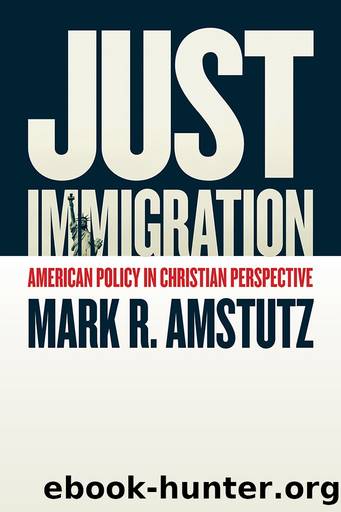Just Immigration: American Policy in Christian Perspective by Mark R. Amstutz

Author:Mark R. Amstutz
Language: eng
Format: epub
Publisher: William B. Eerdmans Publishing Company
The Bible and Political Advocacy
What role should Scripture play in advancing public policies? Should biblical passages be used to justify and promote policy reform? Some Evangelicals have argued that comprehensive immigration reform is justified biblically. An official of the Evangelical Immigration Table, for example, writes, âScripture is at the center of why I and so many American Evangelicals have become vocal advocates of immigration reform.â37 Most Evangelicals concerned with immigration reform, however, are far more reluctant to justify policy advocacy using the Bible. Some of the immigration studies by Evangelical groups emphasize that Scripture should not be used to advance policy goals. The National Association of Evangelicalsâ âImmigration 2009â resolution declares, for example, that the Bible does not offer âa blueprint for modern legislation.â38 The CRC immigration study similarly emphasizes the limits of Scripture in making public policy. It observes that Godâs commands to the ancient Israelites, as recorded in the Old Testament, provide important principles that can help frame contemporary concerns. At the same time, it emphasizes that the church should not âcommit the error of adopting Godâs theocratic blueprint for Israel as though it represents government structures, laws, and policies that must be incorporated in the United States . . . today.â39 According to Carroll, the Old Testament does not offer âa blueprint for actionâ on immigration concerns.40 And after examining Jesusâ teachings, he says that âthere is no explicit teaching on immigration in the Gospels.â41
Despite the acknowledgment that Scripture should not be used to directly advance specific public policies, most of the Evangelical immigration documents that I examined do just that, implicitly if not explicitly. They do so by using specific biblical texts to emphasize certain themes, such as hospitality and compassion, and by selectively using biblical principles to advance particular policy goals. Indeed, the major shortcoming of Evangelical advocacy is the uneven and unbalanced use of scriptural norms to advance specific public policy goals, such as legalization of unauthorized aliens. But the misuse or selective use of the Bible not only distorts divine revelation but potentially undermines the churchâs moral authority. To avoid such distortion, some denominational statements provide a balanced listing of biblical principles but then recommend actions that are consistent with only some of the norms. Another equally serious limitation occurs when the recommended actions are totally divorced from the biblical analysis preceding it. These limitations have been consistently evident in Evangelical declarations that emphasize human dignity, on the one hand, and the rule of law and border security, on the other hand.
The 2011 Southern Baptist Convention resolution on immigration, for example, calls attention to such biblical ideals as human dignity, compassion, and the rule of law, and to governmental norms such as border security and lawful employment practices.42 Finally, it recommends the legalization of unauthorized aliens, and does so independently of the other pronouncements and without acknowledging the inherent tension between the rule of law and the legalization of those who have violated the law. The â2014 Resolution on Immigrationâ by the Evangelical
Download
This site does not store any files on its server. We only index and link to content provided by other sites. Please contact the content providers to delete copyright contents if any and email us, we'll remove relevant links or contents immediately.
Cecilia; Or, Memoirs of an Heiress — Volume 1 by Fanny Burney(32523)
Cecilia; Or, Memoirs of an Heiress — Volume 2 by Fanny Burney(31928)
Cecilia; Or, Memoirs of an Heiress — Volume 3 by Fanny Burney(31912)
The Great Music City by Andrea Baker(31894)
We're Going to Need More Wine by Gabrielle Union(19019)
All the Missing Girls by Megan Miranda(15882)
Pimp by Iceberg Slim(14461)
Bombshells: Glamour Girls of a Lifetime by Sullivan Steve(14036)
For the Love of Europe by Rick Steves(13792)
Talking to Strangers by Malcolm Gladwell(13327)
Norse Mythology by Gaiman Neil(13312)
Fifty Shades Freed by E L James(13214)
Mindhunter: Inside the FBI's Elite Serial Crime Unit by John E. Douglas & Mark Olshaker(9283)
Crazy Rich Asians by Kevin Kwan(9256)
The Lost Art of Listening by Michael P. Nichols(7475)
Enlightenment Now: The Case for Reason, Science, Humanism, and Progress by Steven Pinker(7287)
The Four Agreements by Don Miguel Ruiz(6726)
Bad Blood by John Carreyrou(6597)
Weapons of Math Destruction by Cathy O'Neil(6243)
